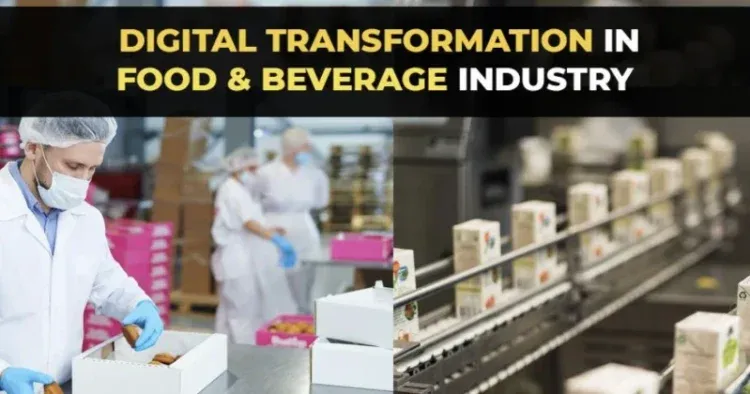Feeding Innovation: Industry 4.0's impact on food & beverage sector

Industry 4.0 is a term that refers to the fourth industrial revolution that involves the integration of digital technologies such as IoT, cloud computing, artificial intelligence, blockchain and more into the manufacturing and supply chain processes.
Industry 4.0 aims to improve the efficiency, quality, safety and sustainability of the production and distribution of goods and services. Industry 4.0 has been transforming the food and beverage sector by enabling faster delivery time, lower delivery costs, higher customer satisfaction, and greater market reach and in many other ways such as:
- It can improve productivity and efficiency by using sensors, simulations and analytics to monitor and control the production parameters and environmental conditions.
- It can enhance food safety surveillance, traceability and product recall by using smart machines that can communicate with each other and track the origin and movement of raw materials and finished products along the value chain.
- It can increase customer satisfaction, personalisation and innovation by using cloud systems, blockchain and artificial intelligence to collect and analyse customer feedback, preferences and trends and to create new products and services that meet their needs.
- It can reduce costs and increase profit margins by optimising resource utilisation, energy consumption and waste reduction.
- It can enable more potential for innovation and accelerated response to customer needs by using digital technologies to create a more dynamic, connected and intelligent ecosystem.
Industry 5.0 in the Food & Beverage Industry
Industry 5.0 is a new paradigm that aims to reinforce the role and contribution of humans in the industry. It is a human-centric approach that focuses on the well-being of employees and society as a whole. The food and beverage industry is slowly transitioning to Industry 4.0, and the progression into Industry 5.0 is already being conceptualised.
Industry 5.0 is a relatively new concept that provides a vision of industry that aims beyond efficiency and productivity as the sole goals, and reinforces the role and the contribution of industry to society. It places the wellbeing of the worker at the center of the production process and uses new technologies to provide prosperity beyond jobs and growth while respecting the production limits of the planet.
In the context of food and beverage, Industry 5.0 could mean using technologies such as automation, robotisation, big data analytics, smart systems, virtualisation, AI, machine learning and Internet of Things to improve the quality, safety, and sustainability of food production and consumption.
Industry 5.0 can transform the food and beverage sector by enabling more human-centric and sustainable production systems using new technologies to create more value for society and the environment, while also improving efficiency and quality. Here are some more examples of how this can be done:
- Using smart systems, sensors and simulations to monitor and control the temperature, pressure, pH, and other parameters of food processing operations, ensuring optimal product quality, safety and traceability throughout the supply chain.
- Using artificial intelligence–based autonomous systems to adjust the processing parameters in real time based on the feedback from sensors and simulations, reducing human errors and increasing productivity so as to create personalised and customised food products that meet consumer preferences and dietary needs.
- Implementing circular economy principles to reduce food waste, reuse resources, and regenerate natural systems.
- Using additive manufacturing or 3D printing to create customised food products with different shapes, textures, flavors, and nutritional profiles, catering to individual consumer preferences and needs.
- Using cloud systems and blockchain to store and share data on the origin, processing, transportation, and storage of food products, enhancing traceability and transparency throughout the supply chain.
- Using human-machine collaboration apps to train and assist workers in performing complex or hazardous tasks, improving their skills, creativity, and satisfaction.
- Using social responsibility and ethical standards to guide the selection of raw materials, suppliers, partners, and customers, ensuring that the food production process respects human rights, animal welfare, and environmental sustainability.
)
)
)



)
)
)
)
)
)
)
)
)
)
)
)
)
)
)
)
)
)
)
)
)
)
)
)
)
)
)
)
)
)
)
)
)
)
)
)
)
)
)